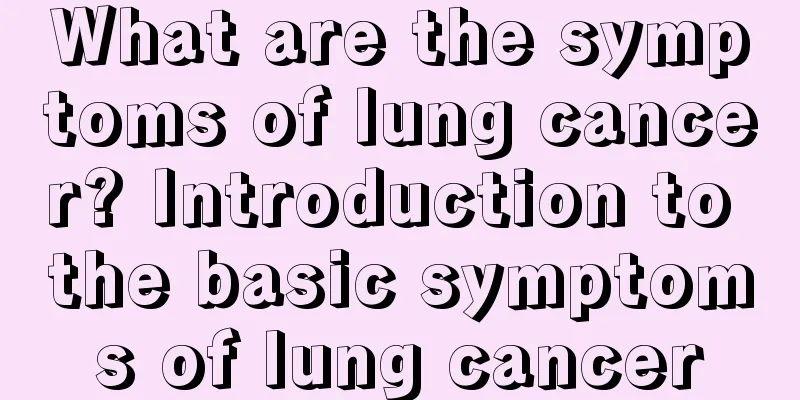Does sweating during heart failure mean the condition is getting worse?

|
Patients with heart failure often have difficulty breathing because the heart does not beat frequently enough, which causes problems with the patient's respiratory system. Heart failure can cause all the body's organs to fail. In addition, they will feel a cough. The most obvious thing is that the patient will sweat and feel weak. Clinical symptoms/heart failure Left heart failure (A) Dyspnea is the earliest and most common symptom of left heart failure. It is mainly caused by acute or chronic pulmonary congestion and decreased vital capacity. In mild cases, dyspnea only occurs during heavy physical labor and disappears quickly after rest, so it is called exertional dyspnea. This is because labor increases the amount of blood returning to the heart, which, when the right heart function is normal, aggravates pulmonary congestion. As the disease progresses, people will feel shortness of breath even with light physical activity. In severe cases, people will also feel shortness of breath when resting, so that they are forced to adopt a semi-recumbent or sitting position, which is called orthopnea (orthopnea). Because sitting can affect the blood by gravity, it accumulates in the low parts such as the lower limbs and abdomen. The amount of blood returning to the heart is less than when lying flat, and pulmonary congestion is reduced. At the same time, when sitting, the diaphragm drops, and the vital capacity increases, which relieves breathing difficulties. Paroxysmal nocturnal dyspnea is a manifestation of left heart failure. Patients often wake up from a deep sleep, feel suffocated, are forced to sit up, cough frequently, and experience severe dyspnea. In mild cases, the symptoms disappear within a few minutes after sitting up. In severe cases, cyanosis, cold sweat, and wheezing sounds can be heard in the lungs during an attack, which is called cardiac asthma. In severe cases, it may develop into pulmonary edema, with large amounts of foamy bloody sputum, moist rales in both lungs, a drop in blood pressure, and even shock. (ii) Cough and hemoptysis are common symptoms of left heart failure. It is caused by congestion of the alveolar and bronchial mucosa, often accompanied by dyspnea and coughing up hemochromic foamy or bloody sputum. (iii) Other symptoms may include fatigue, insomnia, palpitations, etc. In severe cerebral hypoxia, Cheyne-Stokes respiration, drowsiness, dizziness, loss of consciousness, convulsions, etc. may occur. (IV) In addition to the existing signs of heart disease, the patient may have a diastolic gallop rhythm in the apical area, a hyperactive second heart sound in the pulmonary valve auscultation area, scattered moist rales at the base of both lungs, and in severe cases, both lungs are covered with moist rales accompanied by wheezing, and alternating pulses are often present. Right heart failure 1. Upper abdominal distension It is an early symptom of right heart failure. It is often accompanied by loss of appetite, nausea, vomiting and upper abdominal pain, which is mostly caused by congestion of the liver, spleen and gastrointestinal tract. The liver is congested, swollen and tender. Patients with acute right heart failure and acute congestion and swelling of the liver may have acute upper abdominal distension and pain, which may be misdiagnosed as acute abdomen. Long-term chronic hepatic congestion and hypoxia can cause hepatocyte degeneration and necrosis, and eventually develop into cardiogenic cirrhosis, abnormal liver function or jaundice. If tricuspid regurgitation coexists, an expansive pulsation may be felt by palpation of the liver. (ii) Distended jugular veins It is a more obvious sign of right heart failure. It often appears earlier than subcutaneous edema or hepatomegaly. At the same time, abnormal filling of superficial veins such as the sublingual vein and the arm can be seen. When the congested and swollen liver is compressed, the jugular vein distension becomes more obvious. This is called a positive hepatojugular reflux sign. |
<<: What does a routine blood test mainly check?
>>: How to warm up before running?
Recommend
Can I eat bonito if I have constipation
Bonito flakes is a cold-water fish and is usually...
Nursing measures for patients with lymphoma
For patients with lymphoma, professional treatmen...
Is having too much sex harmful to your health?
Human beings are a combination of seven emotions ...
What are the benefits of drinking Dendrobium nobile soaked in water
Dendrobium candidum is a particularly precious Ch...
How long will the vaccine fever last
After vaccination, the human body will experience...
Why is the survival time of liver cancer short?
Liver cancer is the third most common malignant t...
What are the early symptoms of colorectal cancer
Colorectal cancer is also known as "colorect...
What is the technique for massaging the cervical spine?
I believe that many friends have experienced cerv...
What are some folk remedies for chronic inflammation of both lungs?
Chronic inflammation of both lungs should be rela...
What is the reason for brown urine
If you find that your urine is brown in color in ...
How to detect malignant prostate tumors early
Prostate tumors can be divided into benign tumors...
Is anthocyanin effective in removing radiation?
As the Internet continues to penetrate into peopl...
What ointment should be applied for paronychia
I guess only people who have suffered from parony...
What are the advanced symptoms of lung cancer? These are the common symptoms of advanced lung cancer
Lung cancer is a malignant tumor disease. Once it...
What are the methods for cleaning the range hood mesh cover
When cleaning the range hood, you may not know th...









